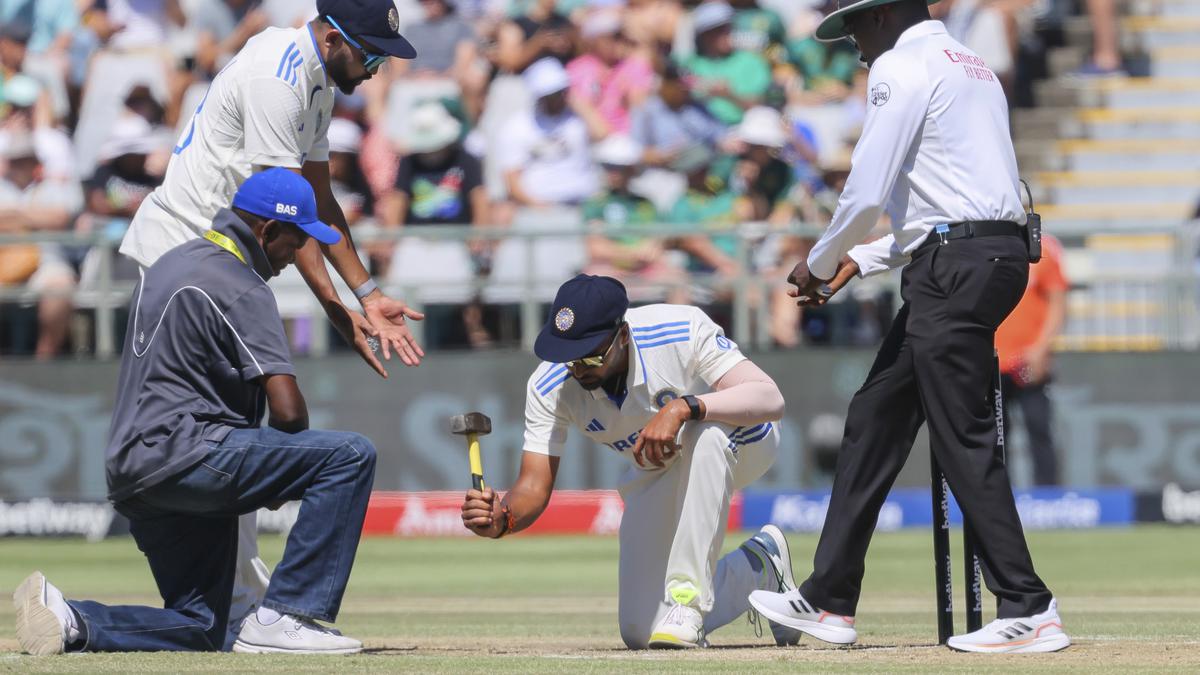- January 10, 2024
Cape Town Test | Sport, like art, need not make sense; it can be enjoyed still

India attempt to flatten out a problem area on the pitch during the second day of the second Test match between South Africa and India in Cape Town, South Africa, on January 4, 2024. Suresh Menon writes that the idea of a dodgy pitch spreads quickly within a team – it becomes a self-fulfilling reality.
| Photo Credit: AP
There was a screen between me and the action in Cape Town. The television screen. Sometimes this can be an advantage, the presentation of the game from different angles. Often it is a disadvantage (even when the commentary is turned off) because, in effect, you are watching the game through someone else’s eyes.
The 642-ball Test there must rate as one of the strangest played. It has inspired many theories and many might-have-beens from experts, players and viewers. It was riveting in the way natural phenomenon like a volcano eruption is (when there are no casualties). It was a reminder that so much of what we take as the gospel truth regarding cause-and-effect is based on uncertainties.
Was it good for Test cricket? It was certainly better than a five-day draw eked out by defensive play and unimaginative captaincy. Sometimes the individual controlled an outcome, at other times the individual succumbed.
This mixture made it impossible to pin down motives and rationales in our usual glib fashion. So you sat back and enjoyed it untroubled by the compulsion to explain or even understand everything; too much knowledge can occasionally extinguish the pleasure.
Fact is, there is only one honest answer to the question: What happened? It is, “I don’t know.” Anything else sounds contrived. A reporter or commentator making that admission might lose his job, so he deals in certainties, in straight lines leading inevitably from one incident to the next.
The safest course would be to blame the pitch. South Africa were dismissed for 55, and India lost six wickets without a run being scored. These are Exhibits ‘A’ and ‘B’. Fast bowlers took 32 of the 33 wickets to fall, that’s Exhibit ‘C’. Exhibit ‘D’ is what didn’t happen: Two spinners with over 400 wickets between them were not required to bowl. Yet – Exhibit ‘E’ – a batsman made an attacking century (Aidan Markham 106 off 103 balls) when no one else in his team crossed 20 in either innings.
The pitch wasn’t the greatest. The idea of a dodgy pitch spreads quickly within a team – it becomes a self-fulfilling reality.
Philosophical question
You can put down the below-par performances to technical deficiencies in batting, yet you come to the philosophical question: Can we really know anything for certain? Also, does everything have to make sense?
Do we rely too much on convenient and easily-digested ‘technical’ explanations in sport when a toothache or a fight with a spouse might be the cause for a specific course of action? Not that such was the case here, but a match like this makes us examine our studied responses.
Sport, like art, need not make sense. It need not be susceptible to straightforward explanations. Therein lies its beauty.
When I was starting out as a reporter, Mohinder Amarnath played two memorable away series against the world’s best fast bowlers. He made 584 runs in Pakistan and 598 in the West Indies, with five centuries in 11 Tests. This against Imran Khan, Sarfraz Nawaz, Andy Roberts, Malcolm Marshall, Michael Holding, Joel Garner.
An authority on the game then explained Amarnath’s technique. “For him the danger ball was the yorker,” he said, “he was on the lookout for it. Anything else he swung his bat at and he got away with it.”
It was one of those theories that balanced on the edge of meaning; only an expert could say something that made no sense to anybody else. Later I asked Amarnath about this. I am not sure whether he said “bunkum” or “nonsense”, but that was the gist of his response.
Occam’s Razor (“it is pointless to do with more explanations what can be done with fewer”) usually works in sport because the unexpected is built into it. In some ways sport reflects the uncertainties of life itself, whether physical or biological. If that weren’t the case, it would be the most boring of activities.
It is difficult to find an overarching explanation for the Cape Town Test that includes South Africa’s first innings, India’s slide as well as Markham’s century. And we should be grateful for that. Pigeon-holing ruins the appreciation of sport.







